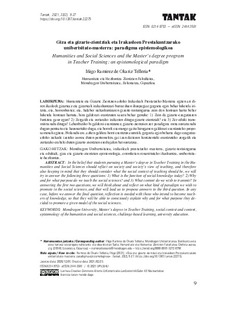| dc.rights.license | Attribution-NonCommercial-NoDerivatives 4.0 International | * |
| dc.contributor.author | Telleria, Iñigo Ramirez de Okariz | |
| dc.date.accessioned | 2022-03-04T14:35:27Z | |
| dc.date.available | 2022-03-04T14:35:27Z | |
| dc.date.issued | 2021 | |
| dc.identifier.issn | 0214-9753 | en |
| dc.identifier.other | https://katalogoa.mondragon.edu/janium-bin/janium_login_opac.pl?find&ficha_no=167403 | en |
| dc.identifier.uri | https://hdl.handle.net/20.500.11984/5480 | |
| dc.description.abstract | Humanitate eta Gizarte Zientzien arloko Irakasleak Prestatzeko Masterra egiten ari di-ren ikasleek gizarteaz eta gizarteak irakaskuntzari buruz duen ikuspegiaz gogoeta egin behar luketela iri-tzita, eta, horrenbestez, eta, halaber irakaskuntzaren gizarte-testuingurua zein den kontuan hartu behar luketela kontuan hartuta, hiru galderari erantzuten saiatu behar genuke: 1) Zein da gizarte-ezagutzaren funtzioa gaur egun? 2) Zergatik eta zertarako irakasten ditugu gizarte-zientziak? eta 3) Zer eduki trans-mititu nahi ditugu? Lehenbiziko bi galderei erantzunez, gizarte-zientzien zer paradigma mota sustatu nahi dugun pentsatu eta hausnartuko dugu, eta horrek eramango gaitu hirugarren galderari erantzuteko propo-samenak egitera. Nolanahi ere, azken galdera horri erantzun aurretik, gogoeta egin beharra dago ezagutza-arloko irakasle izateko asmoa duten pertsonekin, gai izan daitezen kontzienteki erantzuteko zergatik eta zertarako erabaki duten gizarte-zientzien eredu jakin bat sustatzea. | eu |
| dc.description.abstract | In the belief that students pursuing a Master’s degree in Teacher Training in the Hu-manities and Social Sciences should reflect on society and society’s view of teaching, and therefore also keeping in mind that they should consider what the social context of teaching should be, we will try to answer the following three questions: 1) What is the function of social knowledge today? 2) Why and for what purpose do we teach the social sciences? and 3) What content do we wish to transmit? In answering the first two questions, we will think about and reflect on what kind of paradigm we wish to promote in the social sciences, and that will lead us to propose answers to the third question. In any case, before we answer the final question, reflection is needed with those who intend to become teach-ers of knowledge, so that they will be able to consciously explain why and for what purpose they de-cided to promote a given model of the social sciences. | en |
| dc.language.iso | eus | en |
| dc.rights | © 2021 UPV/EHU | en |
| dc.rights.uri | http://creativecommons.org/licenses/by-nc-nd/4.0/ | * |
| dc.subject | Mondragon Unibertsitatea | eu |
| dc.subject | Irakasleak prestatzeko masterra | eu |
| dc.subject | Gizarte-testuingurua eta edukiak | eu |
| dc.subject | Giza eta gizarte-zientzien epistemologia | eu |
| dc.subject | Erronketan oinarritutako ikaskuntza | eu |
| dc.subject | Unibertsitate-hezkuntza | eu |
| dc.subject | Mondragon University | en |
| dc.subject | Master’s degree in Teacher Training | en |
| dc.subject | Social context and content | en |
| dc.subject | Epistemology of the humanities and social sciences | en |
| dc.subject | Challenge-based learning | en |
| dc.subject | University education | en |
| dc.title | Giza eta gizarte-zientziak eta irakasleen Prestakuntzarako unibertsitate-masterra: paradigma epistemologikoa | eu |
| dc.type | http://purl.org/coar/resource_type/c_6501 | |
| dcterms.accessRights | http://purl.org/coar/access_right/c_abf2 | en |
| dcterms.source | Tantak | en |
| local.contributor.group | Berrikuntza eta esku-hartzea gizarte kulturanitz eta eleanitzetan | eu |
| local.description.peerreviewed | true | en |
| local.description.publicationfirstpage | 9 | en |
| local.description.publicationlastpage | 27 | en |
| local.identifier.doi | https://doi.org/10.1387/tantak.22275 | en |
| local.source.details | Vol. 33, nº 2, pp. 9-27 | en |
| oaire.format.mimetype | application/pdf | |
| oaire.file | $DSPACE\assetstore | |
| oaire.resourceType | http://purl.org/coar/resource_type/c_6501 | en |
| oaire.version | http://purl.org/coar/version/c_970fb48d4fbd8a85 | en |








